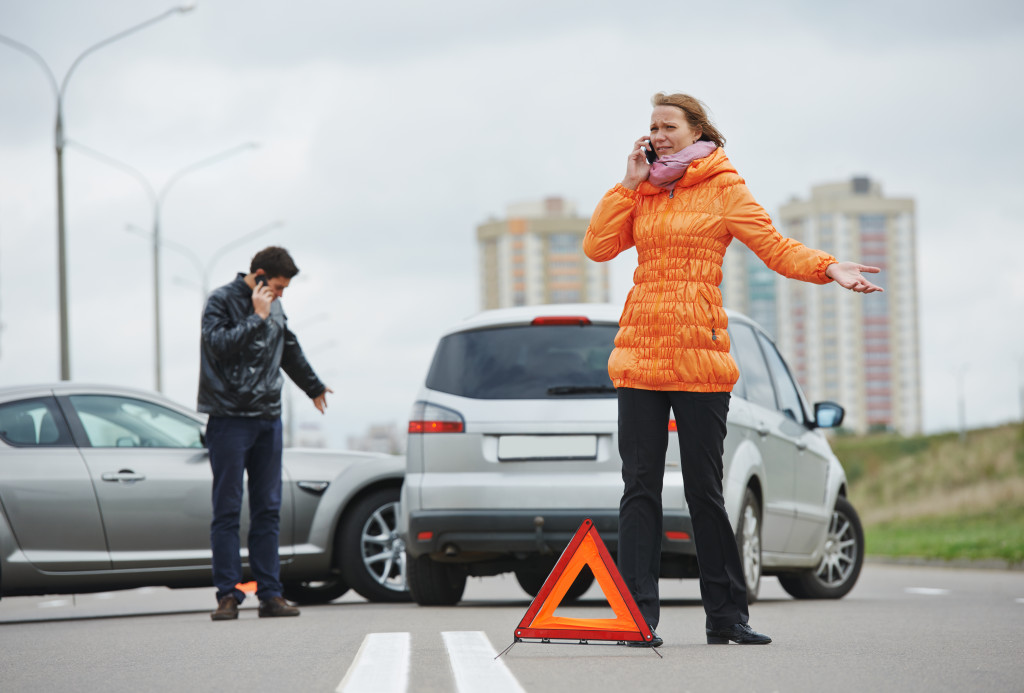- After a car accident, check for injuries, call an ambulance if needed, and gather driver and witness information.
- You should always call the police, provide accurate information, and report hit-and-run incidents.
- You need to gather crucial evidence such as photos, videos, witness statements, and surveillance footage.
- After collecting evidence, contact your insurance company, file a claim, and consider hiring a personal injury lawyer for legal representation.
No one wants to be involved in a car accident, but sometimes they’re inevitable. Whether you’re the driver, passenger, or pedestrian, a car accident can be a traumatic experience, both physically and emotionally. But it’s important to know what actions to take after a car accident, particularly from a legal standpoint. Here are essential things you should know about the legal steps you can take in a car accident.
Check for injuries.
The first thing you want to do after a car accident is to check yourself and others for injuries. Call an ambulance immediately if you or someone else is severely injured. Once everyone is safe, get information from other drivers and witnesses to the accident. This information serves as evidence for the insurance company and your lawyer. Your injuries may also be used to help you receive compensation for your medical bills.
Call the police.
Call the police immediately after the accident, no matter how minor it may be. A police report serves as evidence of the accident, which can help you in the long run. Provide the police with all the necessary details, including your current location, your name, and your contact information.
If you’re involved in a hit-and-run, ask witnesses for any information they might have and report it immediately to the police. You can also use your vehicle’s onboard camera to identify the other driver if possible.
Gather evidence.

Evidence can be crucial for making sure the accident is handled legally. There are different kinds of evidence you can gather from the scene that can help you in a number of ways. Here’s what they are:
Photos.
Taking pictures of the scene is vital. Include images of the vehicles involved, the damage done to them, debris on the road, and anything else that could be relevant. Photos are a great way to prove your case and get the compensation you deserve.
Videos.
If you have a video camera or smartphone, record the scene to capture as much information as possible. This can be helpful for getting an accurate account of what happened in case there’s any dispute over who is at fault.
Witness statements.
If anyone witnessed your accident, get their accounts in writing as soon as you can. Ask for their contact information, and make sure to jot down their statement straight away. Witness statements can be used to strengthen your case and make sure you get the compensation you deserve.
Surveillance footage.
If the accident occurred in an area where surveillance cameras are installed, such as a storefront, traffic intersection, or parking lot, this footage could be invaluable. Request access to this footage as soon as possible, as some systems may overwrite their footage after a certain period. This can serve as an unbiased witness to the accident, providing clear evidence of the events as they unfolded.
By gathering pieces of evidence that can back up your story, you’re taking the right steps to protect yourself legally.
Contact your insurance company.
Once you’ve gathered all the necessary information, contact your insurance company and file a claim. Your insurance agent will guide you through the process and connect you with an adjuster who will evaluate the damages and offer a settlement. If you’re the one responsible for the accident, your insurance company will pay for the other party’s damages.
Hire a lawyer.

Hiring a lawyer after a car accident is a wise decision, especially if the accident was severe and involved injuries. An experienced personal injury lawyer will help you navigate the legal process and represent your best interests if the case goes to court. Be transparent with your lawyer and provide all the necessary information.
Dealing with the aftermath of a car accident can be overwhelming, but taking the proper steps will protect your rights. Remember to check for injuries, call the police, gather all essential evidence, notify your insurance company, and consider retaining a lawyer.
While the accident is unfortunate, handling the situation calmly and diligently is essential to ensure a fair outcome. Being informed about these steps will help you navigate the aftermath of an accident and potentially strengthen your claim should you need to seek compensation or face legal action. Stay safe on the roads and remember, knowing what to do in the aftermath of an accident can make a significant difference.

